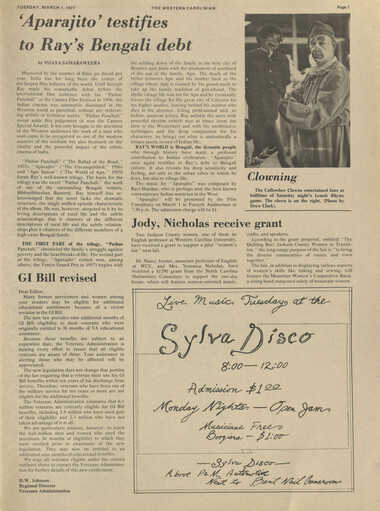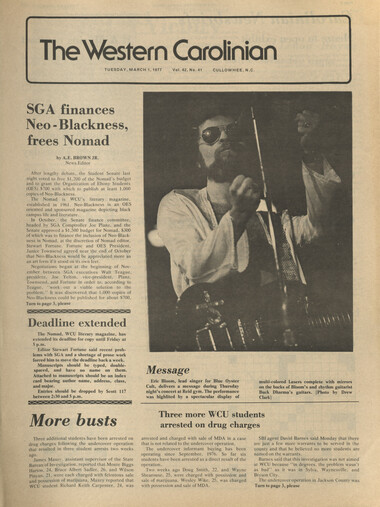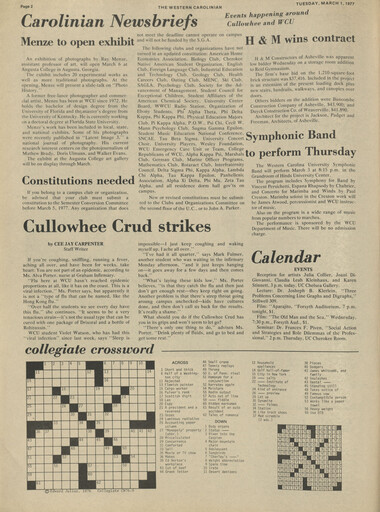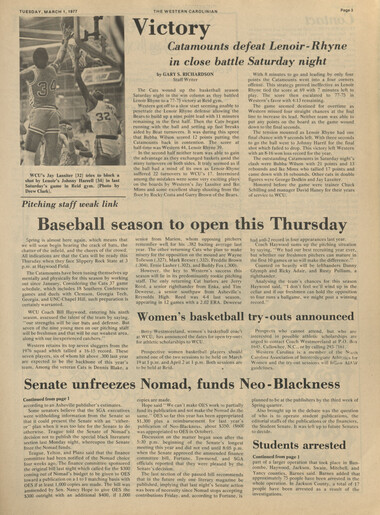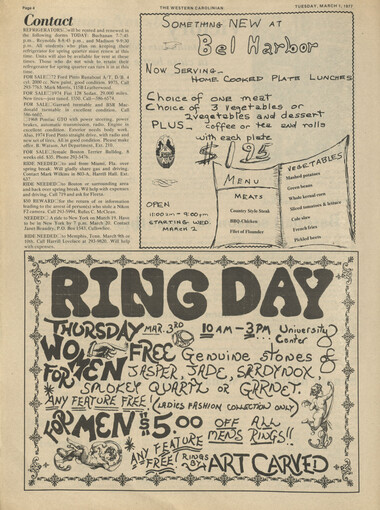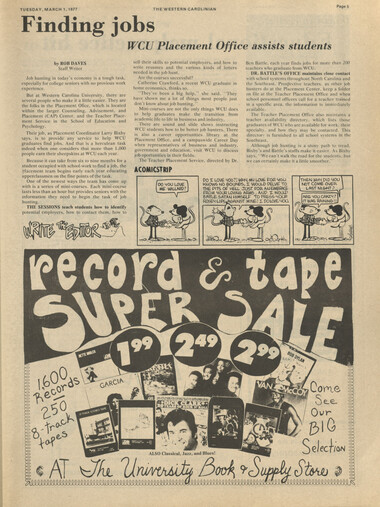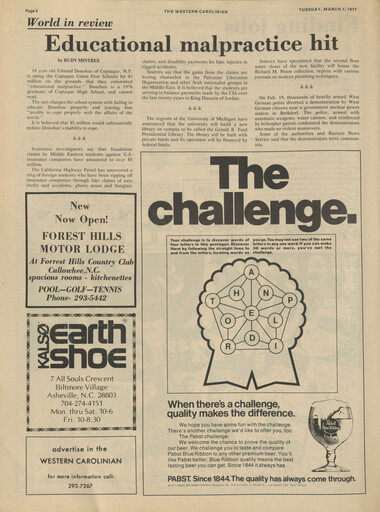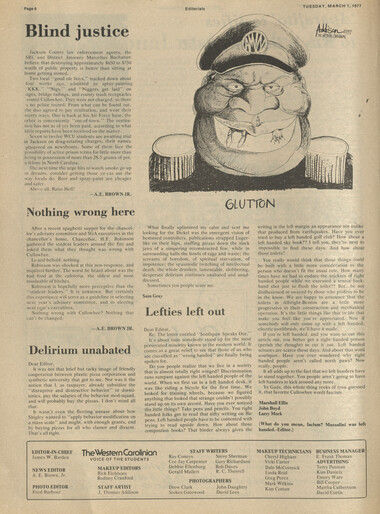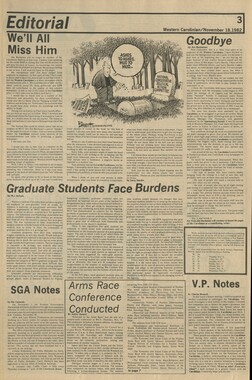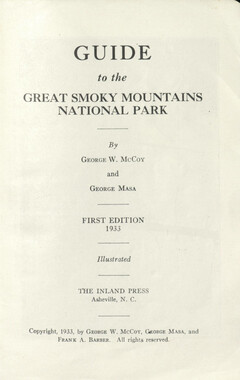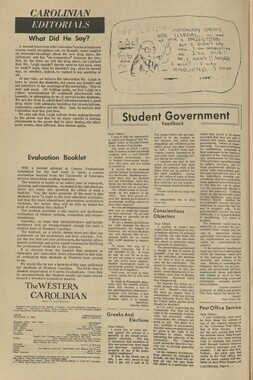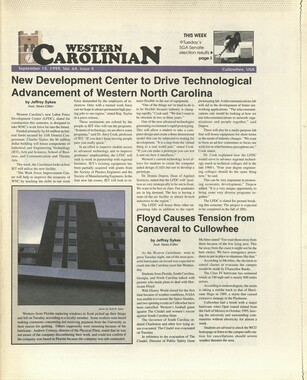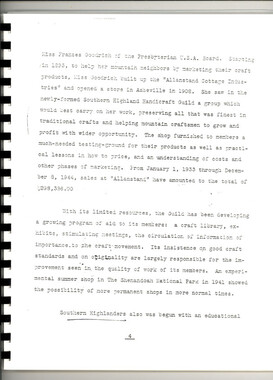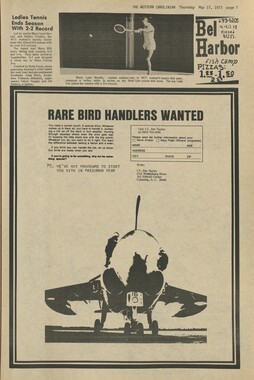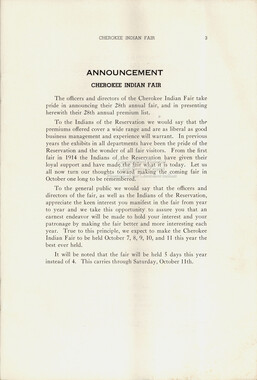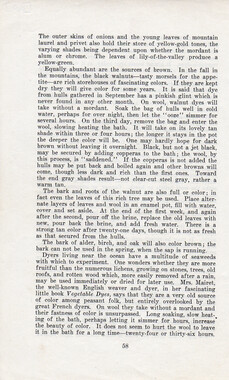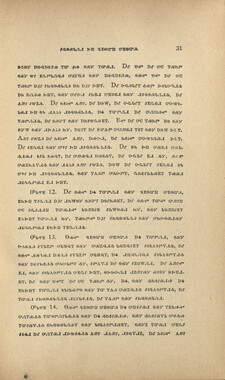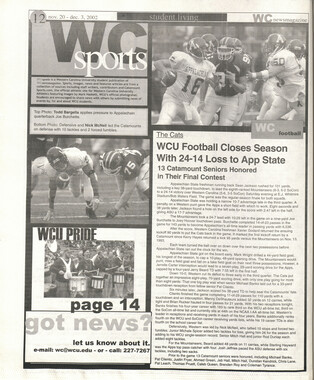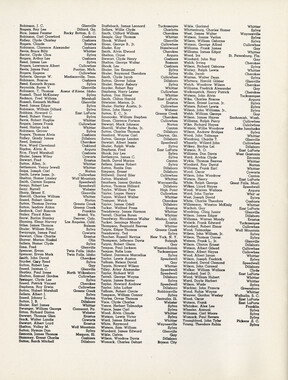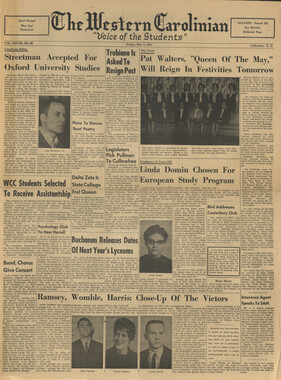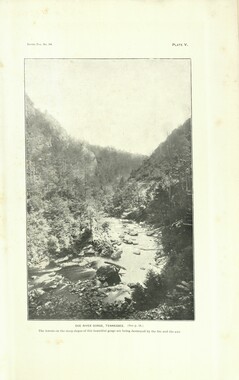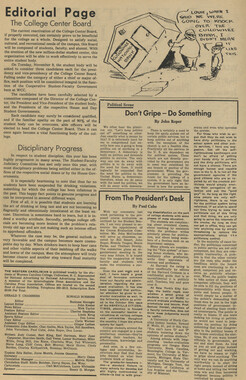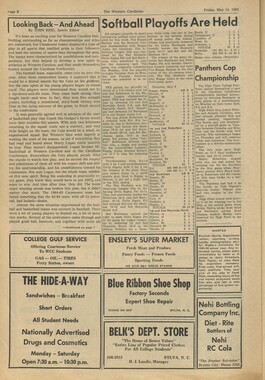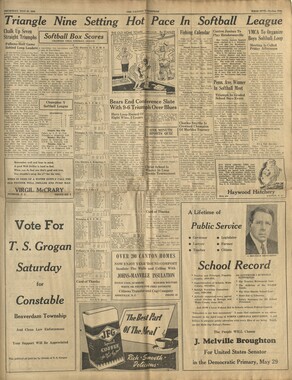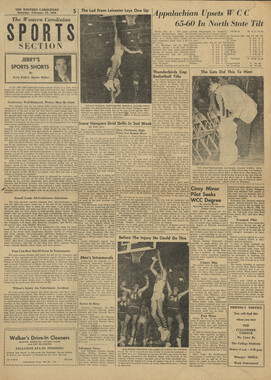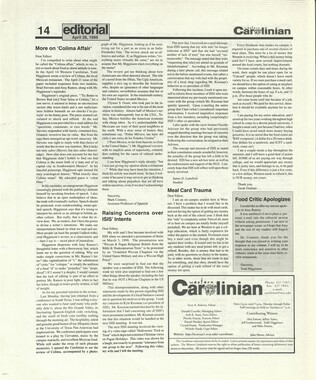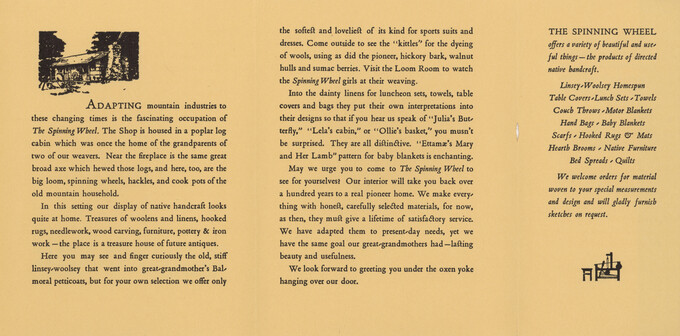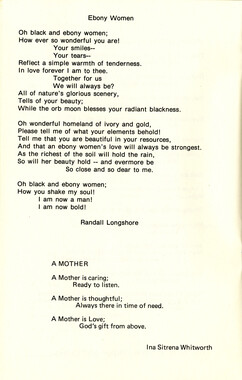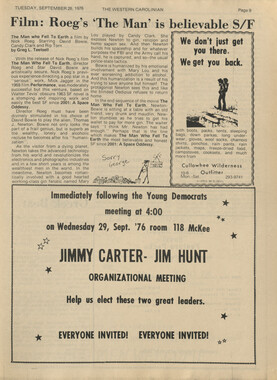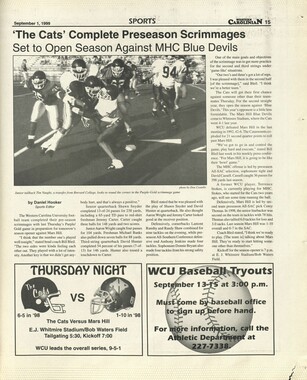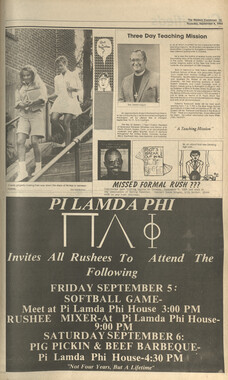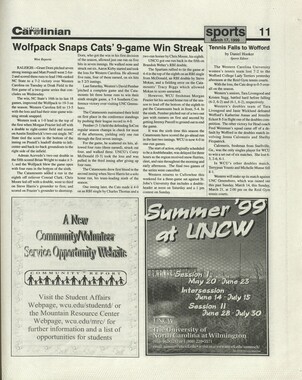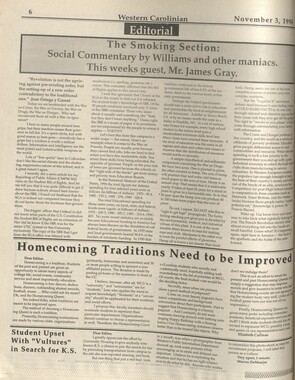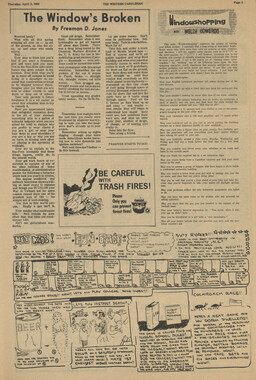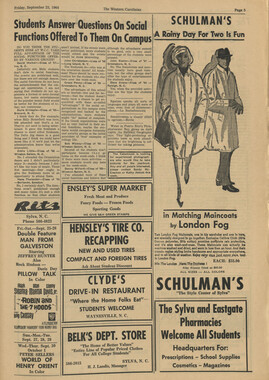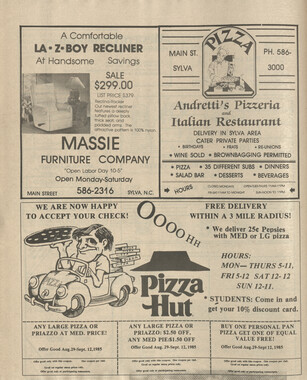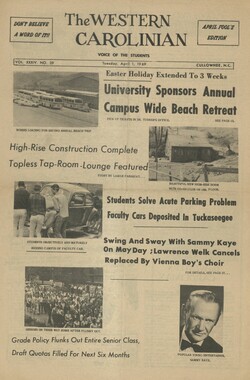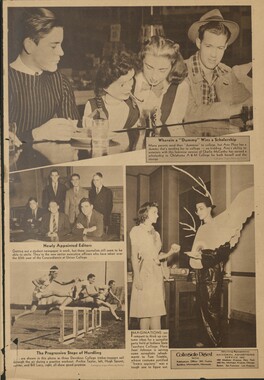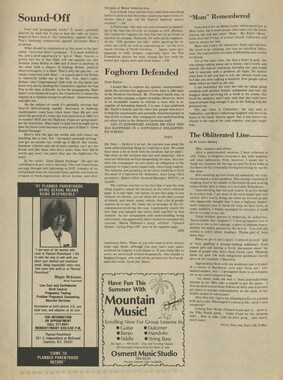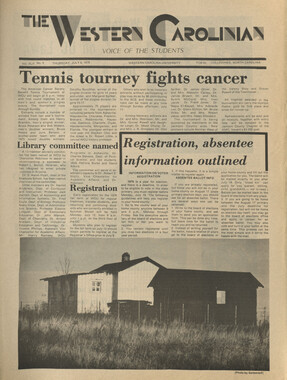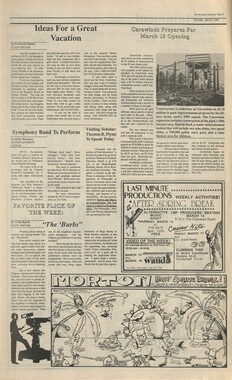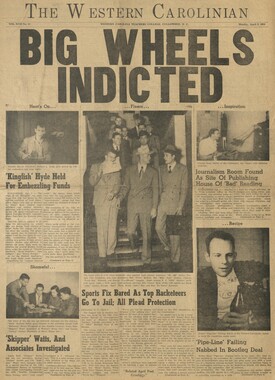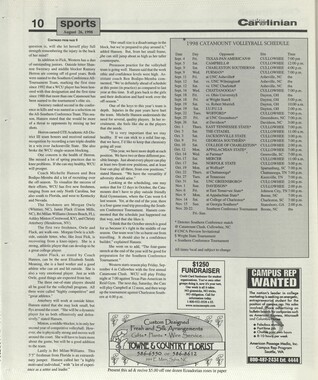Western Carolina University (20)
View all
- Canton Champion Fibre Company (2308)
- Cherokee Traditions (293)
- Civil War in Southern Appalachia (165)
- Craft Revival (1942)
- Great Smoky Mountains - A Park for America (2767)
- Highlights from Western Carolina University (430)
- Horace Kephart (941)
- Journeys Through Jackson (154)
- LGBTQIA+ Archive of Jackson County (26)
- Oral Histories of Western North Carolina (314)
- Picturing Appalachia (6772)
- Stories of Mountain Folk (413)
- Travel Western North Carolina (160)
- Western Carolina University Fine Art Museum Vitreograph Collection (129)
- Western Carolina University Herbarium (92)
- Western Carolina University: Making Memories (708)
- Western Carolina University Publications (2283)
- Western Carolina University Restricted Electronic Theses and Dissertations (146)
- Western North Carolina Regional Maps (71)
- World War II in Southern Appalachia (131)
University of North Carolina Asheville (6)
View all
- Allanstand Cottage Industries (62)
- Appalachian National Park Association (53)
- Bennett, Kelly, 1890-1974 (1388)
- Berry, Walter (76)
- Brasstown Carvers (40)
- Carver, George Washington, 1864?-1943 (26)
- Cathey, Joseph, 1803-1874 (1)
- Champion Fibre Company (233)
- Champion Paper and Fibre Company (297)
- Cherokee Indian Fair Association (16)
- Cherokee Language Program (22)
- Crowe, Amanda (40)
- Edmonston, Thomas Benton, 1842-1907 (7)
- Ensley, A. L. (Abraham Lincoln), 1865-1948 (275)
- Fromer, Irving Rhodes, 1913-1994 (70)
- George Butz (BFS 1907) (46)
- Goodrich, Frances Louisa (120)
- Grant, George Alexander, 1891-1964 (96)
- Heard, Marian Gladys (60)
- Kephart, Calvin, 1883-1969 (15)
- Kephart, Horace, 1862-1931 (313)
- Kephart, Laura, 1862-1954 (39)
- Laney, Gideon Thomas, 1889-1976 (439)
- Masa, George, 1881-1933 (61)
- McElhinney, William Julian, 1896-1953 (44)
- Niggli, Josephina, 1910-1983 (10)
- North Carolina Park Commission (105)
- Osborne, Kezia Stradley (9)
- Owens, Samuel Robert, 1918-1995 (11)
- Penland Weavers and Potters (36)
- Roberts, Vivienne (15)
- Roth, Albert, 1890-1974 (142)
- Schenck, Carl Alwin, 1868-1955 (1)
- Sherrill's Photography Studio (2565)
- Southern Highland Handicraft Guild (127)
- Southern Highlanders, Inc. (71)
- Stalcup, Jesse Bryson (46)
- Stearns, I. K. (213)
- Thompson, James Edward, 1880-1976 (226)
- United States. Indian Arts and Crafts Board (130)
- USFS (683)
- Vance, Zebulon Baird, 1830-1894 (1)
- Weaver, Zebulon, 1872-1948 (58)
- Western Carolina College (230)
- Western Carolina Teachers College (282)
- Western Carolina University (1794)
- Western Carolina University. Mountain Heritage Center (18)
- Whitman, Walt, 1819-1892 (10)
- Wilburn, Hiram Coleman, 1880-1967 (73)
- Williams, Isadora (3)
- Cain, Doreyl Ammons (0)
- Crittenden, Lorraine (0)
- Rhodes, Judy (0)
- Smith, Edward Clark (0)
- Appalachian Region, Southern (2399)
- Asheville (N.C.) (1917)
- Avery County (N.C.) (26)
- Blount County (Tenn.) (161)
- Buncombe County (N.C.) (1671)
- Cherokee County (N.C.) (283)
- Clay County (N.C.) (555)
- Graham County (N.C.) (233)
- Great Smoky Mountains National Park (N.C. and Tenn.) (510)
- Haywood County (N.C.) (3522)
- Henderson County (N.C.) (70)
- Jackson County (N.C.) (4692)
- Knox County (Tenn.) (25)
- Knoxville (Tenn.) (12)
- Lake Santeetlah (N.C.) (10)
- Macon County (N.C.) (420)
- Madison County (N.C.) (211)
- McDowell County (N.C.) (39)
- Mitchell County (N.C.) (132)
- Polk County (N.C.) (35)
- Qualla Boundary (981)
- Rutherford County (N.C.) (76)
- Swain County (N.C.) (2113)
- Transylvania County (N.C.) (247)
- Watauga County (N.C.) (12)
- Waynesville (N.C.) (73)
- Yancey County (N.C.) (72)
- Aerial Photographs (3)
- Aerial Views (60)
- Albums (books) (4)
- Articles (1)
- Artifacts (object Genre) (228)
- Bibliographies (1)
- Biography (general Genre) (2)
- Cards (information Artifacts) (38)
- Clippings (information Artifacts) (191)
- Crafts (art Genres) (622)
- Depictions (visual Works) (21)
- Design Drawings (1)
- Drawings (visual Works) (184)
- Envelopes (73)
- Facsimiles (reproductions) (1)
- Fiction (general Genre) (4)
- Financial Records (12)
- Fliers (printed Matter) (67)
- Glass Plate Negatives (381)
- Guidebooks (2)
- Internegatives (10)
- Interviews (812)
- Land Surveys (102)
- Letters (correspondence) (1013)
- Manuscripts (documents) (619)
- Maps (documents) (177)
- Memorandums (25)
- Minutes (administrative Records) (59)
- Negatives (photographs) (5835)
- Newsletters (1285)
- Newspapers (2)
- Occupation Currency (1)
- Paintings (visual Works) (1)
- Pen And Ink Drawings (1)
- Periodicals (193)
- Personal Narratives (10)
- Photographs (12976)
- Plans (maps) (1)
- Poetry (7)
- Portraits (1960)
- Postcards (329)
- Programs (documents) (151)
- Publications (documents) (2237)
- Questionnaires (65)
- Scrapbooks (282)
- Sheet Music (2)
- Slides (photographs) (402)
- Songs (musical Compositions) (2)
- Sound Recordings (796)
- Specimens (92)
- Speeches (documents) (15)
- Tintypes (photographs) (8)
- Transcripts (322)
- Video Recordings (physical Artifacts) (23)
- Vitreographs (129)
- Text Messages (0)
- A.L. Ensley Collection (275)
- Appalachian Industrial School Records (7)
- Appalachian National Park Association Records (336)
- Axley-Meroney Collection (2)
- Bayard Wootten Photograph Collection (20)
- Bethel Rural Community Organization Collection (7)
- Blumer Collection (5)
- C.W. Slagle Collection (20)
- Canton Area Historical Museum (2110)
- Carlos C. Campbell Collection (282)
- Cataloochee History Project (65)
- Cherokee Studies Collection (4)
- Daisy Dame Photograph Album (5)
- Daniel Boone VI Collection (1)
- Doris Ulmann Photograph Collection (112)
- Elizabeth H. Lasley Collection (1)
- Elizabeth Woolworth Szold Fleharty Collection (4)
- Frank Fry Collection (95)
- George Masa Collection (173)
- Gideon Laney Collection (452)
- Hazel Scarborough Collection (2)
- Hiram C. Wilburn Papers (28)
- Historic Photographs Collection (236)
- Horace Kephart Collection (861)
- Humbard Collection (33)
- Hunter and Weaver Families Collection (1)
- I. D. Blumenthal Collection (4)
- Isadora Williams Collection (4)
- Jesse Bryson Stalcup Collection (47)
- Jim Thompson Collection (224)
- John B. Battle Collection (7)
- John C. Campbell Folk School Records (80)
- John Parris Collection (6)
- Judaculla Rock project (2)
- Kelly Bennett Collection (1407)
- Love Family Papers (11)
- Major Wiley Parris Civil War Letters (3)
- Map Collection (12)
- McFee-Misemer Civil War Letters (34)
- Mountain Heritage Center Collection (4)
- Norburn - Robertson - Thomson Families Collection (44)
- Pauline Hood Collection (7)
- Pre-Guild Collection (2)
- Qualla Arts and Crafts Mutual Collection (12)
- R.A. Romanes Collection (681)
- Rosser H. Taylor Collection (1)
- Samuel Robert Owens Collection (94)
- Sara Madison Collection (144)
- Sherrill Studio Photo Collection (2558)
- Smoky Mountains Hiking Club Collection (616)
- Stories of Mountain Folk - Radio Programs (374)
- The Reporter, Western Carolina University (510)
- Venoy and Elizabeth Reed Collection (16)
- WCU Gender and Sexuality Oral History Project (32)
- WCU Mountain Heritage Center Oral Histories (25)
- WCU Oral History Collection - Mountain People, Mountain Lives (71)
- WCU Students Newspapers Collection (1744)
- Western North Carolina Tomorrow Black Oral History Project (69)
- William Williams Stringfield Collection (2)
- Zebulon Weaver Collection (109)
- African Americans (390)
- Appalachian Trail (35)
- Artisans (521)
- Cherokee art (84)
- Cherokee artists -- North Carolina (10)
- Cherokee language (21)
- Cherokee pottery (101)
- Cherokee women (208)
- Church buildings (167)
- Civilian Conservation Corps (U.S.) (110)
- College student newspapers and periodicals (1830)
- Dams (103)
- Dance (1023)
- Education (222)
- Floods (61)
- Folk music (1015)
- Forced removal, 1813-1903 (2)
- Forest conservation (220)
- Forests and forestry (921)
- Gender nonconformity (4)
- Great Smoky Mountains National Park (N.C. and Tenn.) (181)
- Hunting (38)
- Landscape photography (10)
- Logging (103)
- Maps (84)
- Mines and mineral resources (8)
- North Carolina -- Maps (18)
- Paper industry (38)
- Postcards (255)
- Pottery (135)
- Railroad trains (71)
- Rural electrification -- North Carolina, Western (3)
- School integration -- Southern States (2)
- Segregation -- North Carolina, Western (5)
- Slavery (5)
- Sports (452)
- Storytelling (245)
- Waterfalls -- Great Smoky Mountains (N.C. and Tenn.) (66)
- Weaving -- Appalachian Region, Southern (280)
- Wood-carving -- Appalachian Region, Southern (328)
- World War, 1939-1945 (173)
Western Carolinian Volume 42 Number 41
Item
Item’s are ‘child’ level descriptions to ‘parent’ objects, (e.g. one page of a whole book).
-
-
TUESDAY, MARCH 1, 1977 THE WESTERN CAROLINIAN 'Aparajito' testifies to Ray's Bengali debt by V1JAYASAMARAWF1 RA Measured bv the number of films ptx .lueed per year. India has for long been the venter of the largest film industry of the world. Until Satyajit Ray made Ins remarkable debut before the international film audience with his "Pathar Panchali" at the Cannes Film festival in I956, the Indian cinema was summarily dismissed in the Western world as parochial, without any redeeming artistic or technical merits. "Pathar Panchali" swept aside this judgement (it won the Cannes Speeial Award). It not only brought to the attention of the Western audiences the work of a man who soon came to be recognized as one of the modern masters of lhe medium but also locussed on the vitality and the powerful impact of the ethnic cinema of India. "Pathar Panchali" ("The Ballad of the Road," 1955), "Aparajito" ("The Unvanquished," 1956) and "Apu Sansar" ("The World of Apu," 1959) forms Ray's well-known trilogy. The basis for the trilogy was the novel "Pathar Panchali." the work of one of the outstanding Bengali writers, Bibhutibhushan Banncrji. Ray himself has acknowledged that the novel lacks the dramatic Structure, the single unified episode characteristic of the idiom. He was, however, attracted to it by its loving descriptions of rural life 'and the subtle relationships that it charters of the different descriptions of rural life and the subtle relationships ihat it charters of the different members of a high-caste Bengali family. THE FIRST PART of the trilogy, "Pathar Panchali," chronicled the family's struggle against poverty and the heartbreaks of life. The second part of the trilogy, "Aparajito" (which won. among others, the Venice Grand Prix in 1957) begins with GI Bill revised Dear Editor, Many former servicemen and women among your readers may be eligible for additional educational entitlement because of a recent revision in the GI Bill. The new law provides nine additional months of GI Bill eligibility to most veterans who were originally entitled to 36 months of VA educational assistance. Because these benefits are subject to an expiration date, the Veterans Administration is making every effort to insure that all eligible veterans are aware of them. Your assistance in alerting those who may be affected will be appreciated. The new legislation does not change that portion of the law requiring that a veteran must use his GI Bill benefits within ten years of his discharge from service. Therefore, veterans who have been out of the military service for ten years or more are not eligible for the additional benefits. The Veterans Administration estimates that 6.1 million veterans are currently eligible for GI Bill benefits, including 3.8 million who have used part of their eligibility and 2.3 million who have not taken advantage of it at all. We are particularly anxious, however, to reach the half-million men and women who used the maximum 36 months of eligibility to which they were entitled prior to enactment of the new legislation. They may now be entitled to an additional nine months of educational benefits. We urge all veterans eligible under the criteria outlined above to contact the Veterans Administration for further details of this new entitlement. H.W. Johnson Regional Director Veterans Administration the settling down of the family in lhe liolv city of Benares and deals with the attainment of manhood of the son of the family. Apu. lhe death of the lather removes Aptl and bis mother back to the village where Apu is trained by his grand-uncle to take up the family tradition of priesthood, lhe idyllic village life was not for Apu and he eventually leaves the village for lhe great city of Calcutta for his higher studies, leaving behind bis mother who dies in his absence. Using professional and, as before, amateur actors. Ray unfolds the story with powerful rhythm (which may at times seem loo slow to the Westerner) and with his unobtrusive techniques and the deep compassion for his characters, he brings out what is undoubted!) a unique poetic record of Indian life. RAY'S WORLD is Bengali, the dynamic people who through history have made a profound contribution to Indian civilization. "Aparajito" once again testifies to Ray's debt to Bengali culture. It also reveals his deep sensitivity and feeling, not only to the urban ethos in which he lives, but also to village life. The music for "Aparajito" was composed by Ravi Shankar. who is perhaps now the best known contemporary Indian musician in the West. "Aparajito" will be presented by the Film Conspiracy on March 1 at Forsyth Auditorium at 7:30 p.m. The admission charge will be $1. Jody, Nicholas receive grant Two Jackson County women, one of Ihem an English professor at Western Carolina University, have received a grant to support a pilot "women's fair" next fall. Clowning The Cullowhee Clowns entertained fans at half lime of Saturday night's Lenoir Rhyne game. The clown is on the right. |Photo by Drew Clark |. Dr. Nancy Joyner. associate professor of English at WCU, and Mrs. Veronica Nicholas, have received a $1290 grant from the North Carolina Humanities Committee lo support the one-day forum, which will feature women-oriented music, crafts, and speakers. According to the grant proposal, entitled "The Quilting Bee: Jackson County Women in Transition," the long-range purpose of 1 lie fair is "to bring the diverse communities of county and town together." The fair, in addition to displaying various aspects of women's skills like baking and sewing, will feature the Mountian Women's Cooperative Hand, a string band composed solely of mountain women. (^Lckr^ TfLtcdsdo, Jou2&c6zyc) <zf'trt£<~ g:00— IZjOO
Object
Object’s are ‘parent’ level descriptions to ‘children’ items, (e.g. a book with pages).
-
The Western Carolinian is Western Carolina University's student-run newspaper. The paper was published as the Cullowhee Yodel from 1924 to 1931 before changing its name to The Western Carolinian in 1933.
-
